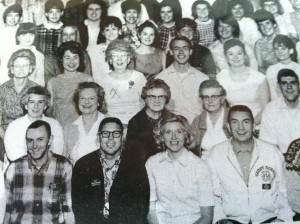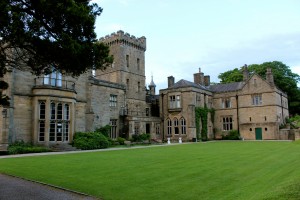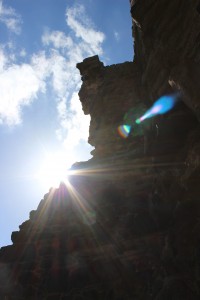With vacation, a planned hike to the summit of St. Helen’s, and a climbing project brewing that I’m excited about sharing later, I recently reread a book called “Bone Games: Extreme Sports, Shaminism, Zen, and the Search for Transcendence”. Rob opens with the story of his most desperate moment. He’s fallen, is seriously injured and stranded on a small ledge with hundreds of vertical feet below waiting to devour him when he tries to down climb – with his injury – in the dark – in the snow. Not only does he pull it off; he recalls those life and death moments as his best climbing ever, when he was filled with grace, peace, and complete confidence. He writes that those were the moments when he experienced the “the best version of myself”. The experience set him on a lifelong journey in search of how and why some people are able to tap into vast stores of energy, power, grace, faith, confidence, while others seem to go through life in a fog, with mediocrity as the default position.
His answers reminded of a book I read years ago by Timothy Warner about spiritual warfare, which declared that we in the developed world, for all our technology and capacity for insulating ourselves from physical suffering, seem blind to the spiritual dimensions of reality that not only real, but constitute the very essence of who we are since it is out from the spirit realm that the power to be the best (or worst) versions of ourselves flows. Material comfort and a world view that discounts the realities of both the dark and light spiritual forces of the universe conspire to rob us of the life for which we’re created, a life filled with joy, confidence, strength, hope, power, love.
Bone Games points us towards the realm of the spirit as the headwaters, the source for this kind of life. It can’t get us to the destination though. Jesus Christ, on the other hand, can and does:
1. He points to himself as the source of all life – not just once, but over and over again throughout the gospel writings. His audacious claim, and the great Paul’s subsequent affirmation of it, make it clear that life cut off from Christ is, at best, a shabby imitation of the real thing. Being the best version of myself, then, begins with the acknowledgement that I need Christ. We’re not talking about future judgement here (that’s a different subject); we’re talking about the one vital ingredient needed if we’re to break out of the deep ruts of consumerism, isolation, and boredom that are quickly defining our culture.
2. I need, then, awareness of my need. It’s one thing to quote a few Bible verses about brokenness and our inherent inability to live well. Actually believing it, though, seems to require being tossed into the deep end of the pool, where all the resources of our education, training, etc. are known, in our deepest souls, to be inadequate for the task at hand. We’re on a cliff and need to down climb with a broken leg. We’re in mile 70 of a 100 mile run and there’s nothing left. The doctor’s report came back positive. We were downsized, or outsourced. The marriage is melting.
The brilliance of how God built the universe is that the very things we rightly try to avoid are almost always the context in which we discover the rich storehouse of divine strength and life we didn’t know we had. Our faith is awakened, or deepened. Our relationship with Christ moves from polite to passionate. We become “the best version of ourselves” Our culture sanitizes like, seeking to remove all suffering and risk. Cultures where the spirit runs deeper do exactly the opposite – imposing suffering as a rite of passage in vision quests, or sweat lodges, or nights spent in isolation on mountaintops. We who love move towards the edge of the cliff for these very reasons need to find ways of building that same posture into our everyday lives in the office and family life, not just on glaciers or tied into the climbing rope.
3. I need to be filled with the Holy Spirit. Those who have spent time in the Bible know that the fruit of the spirit includes love, joy, peace, patience, and a few more delightful things. What we often fail to speak of, though, is the reality that it is this same spirit which “gives life to our mortal bodies” The notion that spirit only affects spirit stems from a notion of divided reality that’s rooted in Greek culture, but the Bible teaches otherwise. We’re deeply integrated – body, soul, and spirit, and this means my prayer life, my meditation, and the extent to which I’m filled with the Holy Spirit can change things like the quality of sleep, anxiety levels, and how my body reacts to stressful situations.
This filling, this practical reality of being infused with a source of life far grander than my mere mortal constitution, requires faith, requires desire for God to control our lives (not just ‘bless our ambitions’ or ‘fix our problems’), requires relinquishment. To be blunt, I’m not sure we even think about this very often, let alone pursue it, let alone achieve. That we don’t is a tragic loss. That we don’t because we’re busy watching gorging ourselves on cultural trivia and fast food makes the tragedy even darker. I know because, like most of us, I can go into that shallow world without even trying.
So, I’m about to take a long walk up Mt. St Helens, hopeful that every step will be toward a life that’s more consistently energized by our friend, The Holy Spirit. That the weather’s an unknown, that we’ll begin in the dark, that we’ve never been this way before, that we’ll spend our muscles along the way ’til we’ve little left – these are (ironically) the blessings of the journey. In the process, I believe we’ll learn something of spirit power. The view from the top is a mere bonus.














